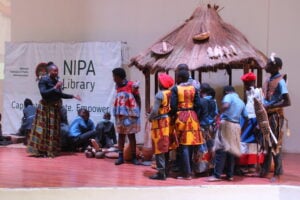Libraries Defending Cultural Rights: an interview with African Librarian Cultural Rights Defenders
01 August 2025
Cultural Rights are among the fundamental rights outlined in the Universal Declaration on Human Rights (UDHR). This article upholds that:
- Everyone has the right freely to participate in the cultural life of the community, to enjoy the arts and to share in scientific advancement and its benefits.
- Everyone has the right to the protection of the moral and material interests resulting from any scientific, literary or artistic production of which he is the author. (UDHR, Article 27)
Human Rights Defenders are defined by a 1998 UN Declaration as, “defenders as individuals or groups who act to promote, protect or strive for the protection and realization of human rights and fundamental freedoms through peaceful means”.
Librarians Defending Cultural Rights
IFLA has been working to raise awareness of the vital contribution that libraries and library professionals around the world make to uphold cultural rights. We are therefore thrilled that, with support from the UN Office of the High Commissioner on Human Rights (OHCHR), we have been able to involve library professionals in recent consultations and trainings for cultural rights defenders.

Mutinta Nabuyanda, member of IFLA’s Advisory Committee on Cultural Heritage and President of the Library and Information Association of Zambia (LIAZ) participated in an online consultation with cultural rights defenders in Africa in March 2025.
Juliana Manyerere, incoming member of IFLA’s Sub-Saharan Regional Division Committee 2025-2027 and Director of Library and Information Services, Institute of Rural Development Planning (IRDP), Tanzania participated in a workshop on cultural rights in East Africa, organised by the OHCHR in Addis Ababa, Ethiopia, in June 2025
In the following interview, they share their experiences on why library professionals are vital to defending cultural rights.
Can you briefly summarise your involvement with the UN OHCHR on defending cultural rights?
Mutinta Nabuyanda
As President of the Library and Information Association of Zambia (LIAZ) and a member of the IFLA Advisory CCH, I participated in consultative meetings convened by the UN Office of the High Commissioner for Human Rights (OHCHR), specifically with the Special Rapporteur in the field of cultural rights.
My contributions reflected how libraries are frontline defenders of the right to access, preservation of local heritage and promotion of community participation in cultural life. In Zambia, libraries are working closely with museums in preservation of indigenous knowledge, documenting and making available information on cultural rights and dissemination of information that supports freedom of expression. These dialogues focused on special emphasis on strengthening global advocacy for cultural rights.
Juliana Manyerere
As a library professional I have been actively engaged in promoting and defending cultural rights in alignment with principles and mechanisms of the UN OHCHR, because my work focuses on ensuring equitable access to information, knowledge and cultural heritage.
Through participation in this recent training, I continue to support efforts that align library services with human rights standards, ensuring that libraries serve not only as a centre of information but also as defenders of cultural identity, freedom of expression and lifelong learning.
Why should library professionals be considered as cultural rights defenders?
Mutinta Nabuyanda
Library professionals are natural defenders of cultural rights because they foster inclusivity, are not biased as they promote equal access to information. We are the gate keepers of diverse cultural heritage through collections and archives. Above all, library professionals are the bridge between information and the community—“Linking people with Information” (LIAZ Motto)
Juliana Manyerere
Library professionals play a vital role in upholding and advancing cultural rights, since libraries ensure that everyone regardless of age, ethnicity, gender, income or ability has equal access to information, knowledge and ideas. Not only that, Library professionals curate and preserve diverse cultural materials. On top of that, librarians uphold freedom of expression and intellectual freedom.
What is one main point to share from your involvement?
Mutinta Nabuyanda
The need for library professionals to showcase the importance of libraries as partners in cultural rights. Library professionals should strategically align themselves and engage with other cultural rights defenders through advocacy and participation in dialogue. Librarians are the only ones best placed to show their critical role in defence of cultural heritage.
Juliana Manyerere
Library professionals are more than custodians of books, they are stewards of knowledge and culture, defenders of equity, and advocates of human dignity.
Thank you to these volunteers for their engagement with the OHCHR! IFLA will continue looking for possibilities to involve library professionals in similar opportunities in the future